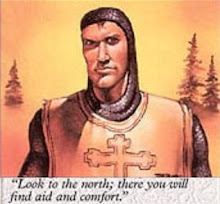I know people who think movies like this are cliche and stupid. Maybe. ...maybe... but Stallone had one line in Expendables 2 that I think really brought home why the 80s action movies were so great, and why action movies since haven't really captured the same feeling, and, in fact, why apparently it takes action movie stars from the 80s to bring it back again:
Why is it the one of us who wants to live the most, who deserves to live the most, dies, and the ones that don't deserve to live keep on living? What's the message in that?
I don't know if this was an intentional dig at modern action movies or not, but that's largely how I took it. In particular, it's why I loved the old action movies and why I really haven't enjoyed anything by Tarantino or movies like No Country for Old Men.
I believe the argument for those movies would be that real life isn't pretty, good guys don't always win and nobody likes cliche bullshit from the 80s. They want it to be real and gritty with stories that have a deeper tale and
Hey, you know what, fuck you.
I get real and gritty every time I turn on the news. Bad guys win all the damn time. Bringing them to justice is a long and arduous task with no clear winners.
People may think that the 80s movies were just about violent killing with shallow storylines and that people like Tarantino just improved on the genre by giving them a fancier spin. After all, his movies have plenty of blood and gore and that's what it was always about, right?
No. That wasn't what it was about.
Violent 80s movies were about the good guys winning and the bad guys getting what was coming to them. I'll grant that they are cheesy and cliche. But it's a good cliche. It's a cliche where a guy goes out, maybe rapes, maybe robs, maybe murders and then, later, gets shot in the face with a large gun. Karma. Usually delivered by Stallone, Schwarzenegger or Bruce Willis, to name a few. In real life, someone commits a terrible crime and maybe next year there will be closure on it. Maybe there will never be closure. In an 80s action film, closure comes in the last 15 minutes of the film, guaranteed. Maybe it's not right, per se, that the bad who who murdered all those people ends up getting a chain around the neck and a knife in the chest. Maybe he should have been brought before justice and put on trial and sent to serve his time in a prison until he could perhaps qualify for probation after years of good behavior, but what he gets is closure.
Again with the Pratchett paraphrasing -- people have to engage in the act of make-believe. We believe in fantasies like justice and mercy and duty and "that sort of thing". Oh, you don't think those are fantasy, just the same as elves and dwarves and Stallone always winning? Then show me a single particle of justice. What is the molecular makeup of mercy? When will the Large Hadron Collider detect duty? These are fantasy concepts.
We invented them because we believe in them. The universe didn't provide them to us so we had to make them up ourselves.
80s action movies were never about violence, per se. They were about karma. They were about good guys winning and bad guys losing. That may not be reality, but it's something I would prefer to believe in, even if it's not true, and I like watching movies where the good guys always win and the bad guys always lose. Call me a dreamer.
